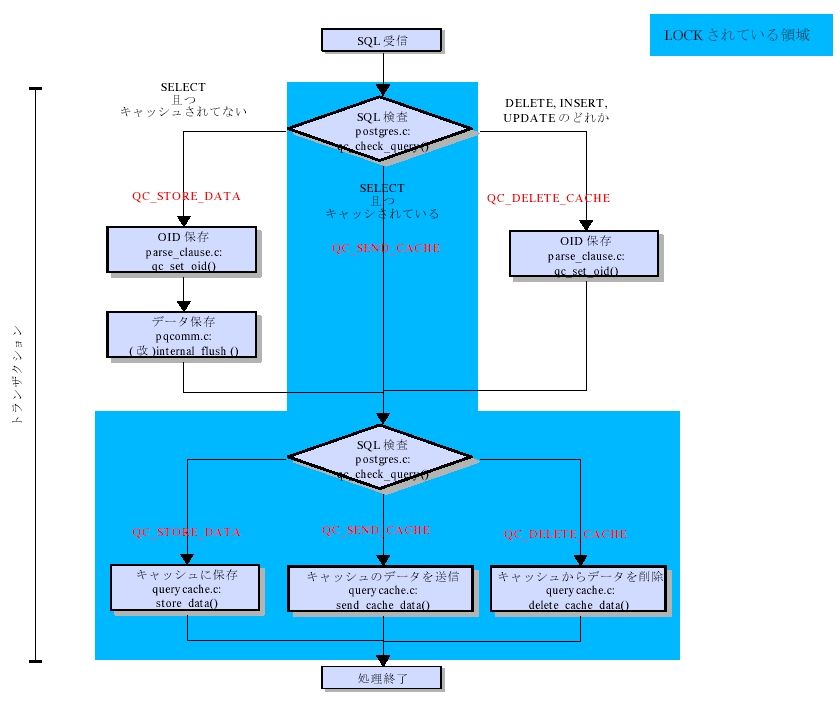3.1.1 アルゴリズムの概略
おおざっぱなアルゴリズム、というか処理フローは次のとおり:
- SELECT, 且つキャッシュされてない場合
- パース結果からoid情報を貰う(qc_set_oid())。
-
結果を送信する直前に、internal_flush()内部で送信データを
ローカルなメモリ領域に書き込み保存(qc_get_data_from_buffer_to_current_query ())。
- 保存したデータ(SELECT文そのもの、OID情報、結果)を共有メモリ上に書き込む(store_data())。
- SELECT, 且つキャッシュされてた場合
-
LOCKをかけたまま、一気に一気にfinish_xact_command()の直前までジャンプする。
- キャッシュに保存されていた結果データを送信する(send_cache_data())。
-
LOCKをかけたまま、一気に一気にfinish_xact_command()の直前までジャンプする。
- テーブル操作(DELETE,UPDATE,INSERT)の場合
-
パース結果からoid情報を貰う(qc_set_oid())。
- 保存しておいたoid情報をもとに、キャッシュ上のデータ(oidに関連するもの全て)を削除する(delete_cache_data())。
-
パース結果からoid情報を貰う(qc_set_oid())。
3.1.1.1 LOCKについて
ここで、LOCKについて一言:
新たに"QueryCacheLock"というLightWeightLockを追加した。
…
TwoPhaseStateLock,
NumFixedLWLocks, /* must be last except for MaxDynamicLWLock */
#ifdef _QUERY_CACHE
QueryCacheLock,
#endif
MaxDynamicLWLock = 1000000000
} LWLockId;
|
src/include/storage/lwlock.hの一部
上の図に示したように、このLOCKは共有メモリ上のキャッシュ情報の読み書きに関する排他制御を行なうために使う。
3.1.2 src/backend/tcop/postgres.c の改造ポイント
postgres.cのexec_simple_query()内で、パースを終了した段階で、クエリを検査する関数:qc_check_query ()を実行する。
commandTag = CreateCommandTag(parsetree);
#ifdef _QUERY_CACHE
if (query_cache && query_cache_local)
if (qc_check_query (commandTag, query_string) == true)
goto QUERYCACHE; /* I don't hesitate using "GOTO". */
#endif
|
exec_simple_query()の一部(1)
そして、もしもデータがキャッシュされていたなら、一気にfinish_xact_command()の直前までGOTOでジャンプする。
キャッシュされてなかったり、DELETE,UPDATE,INSERTだったら通常の処理を行なう。
/*
* Close down transaction statement, if one is open.
*/
#ifdef _QUERY_CACHE
if (query_cache && query_cache_local)
{
pq_flush ();
qc_operate_cache ();
_check_query_cache ("");
}
#endif
finish_xact_command();
|
exec_simple_query()の一部(2)
3.1.3 src/backend/parser/parse_clause.c の改造ポイント
setTargetTable()とtransformTableEntry()の間に挿入されたqc_set_oid()によって、SELECTやDELETE,UPDATE,INSERTに関わるテーブル=oidを、
ローカルメモリ上のメモリ領域(current_query)に保存していく。
int
setTargetTable(ParseState *pstate, RangeVar *relation,
bool inh, bool alsoSource, AclMode requiredPerms)
{
RangeTblEntry *rte;
int rtindex;
/* Close old target; this could only happen for multi-action rules */
…
/*
* Now build an RTE.
*/
rte = addRangeTableEntryForRelation(pstate, pstate->p_target_relation,
NULL, inh, false);
pstate->p_target_rangetblentry = rte;
#ifdef _QUERY_CACHE
if (query_cache && query_cache_local)
qc_set_oid (rte->relid);
#endif
/* assume new rte is at end */
rtindex = list_length(pstate->p_rtable);
Assert(rte == rt_fetch(rtindex, pstate->p_rtable));
|
parse_clause.cの一部(1)
static RangeTblEntry *
transformTableEntry(ParseState *pstate, RangeVar *r)
{
RangeTblEntry *rte;
#ifdef _QUERY_CACHE
/**
* Processing is possible even with
* transformFromClause(ParseState *pstate, List *frmList)
*/
if (query_cache && query_cache_local)
{
Oid oid = RangeVarGetRelid (r, false);
qc_set_oid (oid);
}
#endif
/*
* mark this entry to indicate it comes from the FROM clause. In SQL, the
* target list can only refer to range variables specified in the from
* clause but we follow the more powerful POSTQUEL semantics and
* automatically generate the range variable if not specified. However
* there are times we need to know whether the entries are legitimate.
*/
rte = addRangeTableEntry(pstate, r, r->alias,
interpretInhOption(r->inhOpt), true);
|
parse_clause.cの一部(2)
3.1.4 src/backend/libpq/pqcomm.c の改造ポイント
3.1.4.1 データの保存
qc_get_data_from_buffer_to_current_query ()という長い名前の関数によって、
internal_flush()のsecure_write()がまさにクライアントに送ろうとしているバッファ(PqSendBuffer)内のデータを
ローカルメモリ上のメモリ領域(current_query)に保存していく。
static int
internal_flush(void)
{
static int last_reported_send_errno = 0;
char *bufptr = PqSendBuffer;
char *bufend = PqSendBuffer + PqSendPointer;
#ifdef _QUERY_CACHE
/* ************************************************
* ************** NOT SAFE ! REWRITE ! ************
* ************************************************/
if (query_cache && query_cache_local)
qc_get_data_from_buffer_to_current_query (PqSendBuffer, PqSendPointer);
#endif
while (bufptr < bufend)
{
int r;
r = secure_write(MyProcPort, bufptr, bufend - bufptr);
…
|
pqcomm.cの一部(1)
3.1.4.2 キャッシュデータの送信
qc_pq_flush ()というグローバル関数を用意し、querycache.c内send_cache_data()から呼び出す。
なぜ、グローバル関数を定義したかというと、
バッファ:PqSendBufferに直接書き込むには、こうするしかなかったから。
まさかPqSendBufferをグローバル変数にはできないし。
#ifdef _QUERY_CACHE
int qc_pq_flush (const unsigned char *data, int len);
int
qc_pq_flush (const unsigned char *data, int len)
{
if (query_cache && query_cache_local)
{
PqSendPointer = len;
memcpy ((void *)PqSendBuffer, (const void *)data, len);
return pq_flush ();
}
return 0; /* dummy */
}
#endif
|
pqcomm.cの一部(2)
